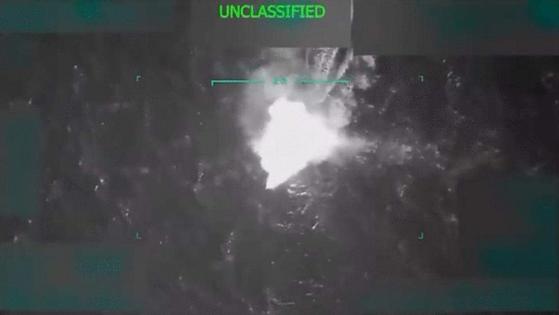Trump declares US in 'armed conflict' with drug cartels in the Caribbean
Published in Political News
President Donald Trump is declaring drug cartels to be “unlawful combatants” and informed members of Congress the United States is in an “non-international armed conflict” with them.
“The president determined these cartels are non-state armed groups, designated them as terrorist organizations, and determined that their actions constitute an armed attack against the United States,” reads the memo from the Pentagon, which was obtained by The Associated Press and The New York Times.
The move comes after the president conducted four armed strikes in the Caribbean on vessels the administration claimed carried drugs. Seventeen alleged drug traffickers were killed in those attacks, of which at least three took place off the coast of Venezuela.
Legal experts and human rights groups questioned Trump’s actions, saying it carried a dangerous precedent about the use of executive power.
However, by saying his actions are part of an active armed conflict, Trump appears to be using war time powers to justify the strikes.
He has been vocal in his threats against the drug cartels.
“If you try to poison our people, we will blow you out of existence because that’s the language they only understand,” the president told military leaders in a speech Tuesday at Quantico, Virginia.
The notice was sent to several congressional committees Wednesday after Democratic lawmakers asked the administration to go to Congress and seek war powers authority in order to continue the strikes.
The White House did not respond to the Miami Herald’s request for comment.
In an armed conflict, a country can lawfully kill enemy fighters even when they pose no threat.
“The President directed the Department of War to conduct operations against them pursuant to the law of armed conflict. The United States has now reached a critical point where we must use force in self-defense and defense of others against the ongoing attacks by these designated terrorist organizations,” the memo states.
Trump has boasted about the strikes and claimed some of the boats were operated by the Venezuelan gang Tren de Aragua. The United States government has declared that group — along with a number of Latin American drug cartels, including Venezuela’s Suns Cartel — as foreign terrorist organizations.
“We’ve recently begun using the supreme power of the United States military to destroy Venezuelan terrorists and trafficking networks led by Nicolás Maduro,” Trump told the United Nations General Assembly last week. “To every terrorist thug smuggling poisonous drugs into the United States of America, please be warned that we will blow you out of existence.”
The White House claimed the president was using his executive powers under Article II of the Constitution to defend the country.
But legal experts questioned that reasoning.
“The president doesn’t just get to say we’re at war,” Professor Rachel E. VanLandingham of Southwestern Law School, a retired Air Force judge who is an expert in military law, told the Herald last month. “This was intentional killing.”
The unlawful-combatants notice was issued amid recent media reports suggesting the administration is reviewing plans for targeted operations inside Venezuela. NBC News reported that options under consideration include drone strikes on cartel figures and clandestine drug labs. While no final decision has been made, officials say potential actions could begin “within weeks.”
It also came as Washington has assembled one of the largest U.S. military deployments the Caribbean has seen in decades. Warships, surveillance aircraft, amphibious vessels, and even a nuclear-powered submarine have been stationed off Venezuela’s northern coast. Although U.S. officials insist the mission is focused on drug interdiction, critics argue it doubles as a show of force against the Nicolás Maduro socialist regime.
©2025 Miami Herald. Visit at miamiherald.com. Distributed by Tribune Content Agency, LLC.
























































Comments